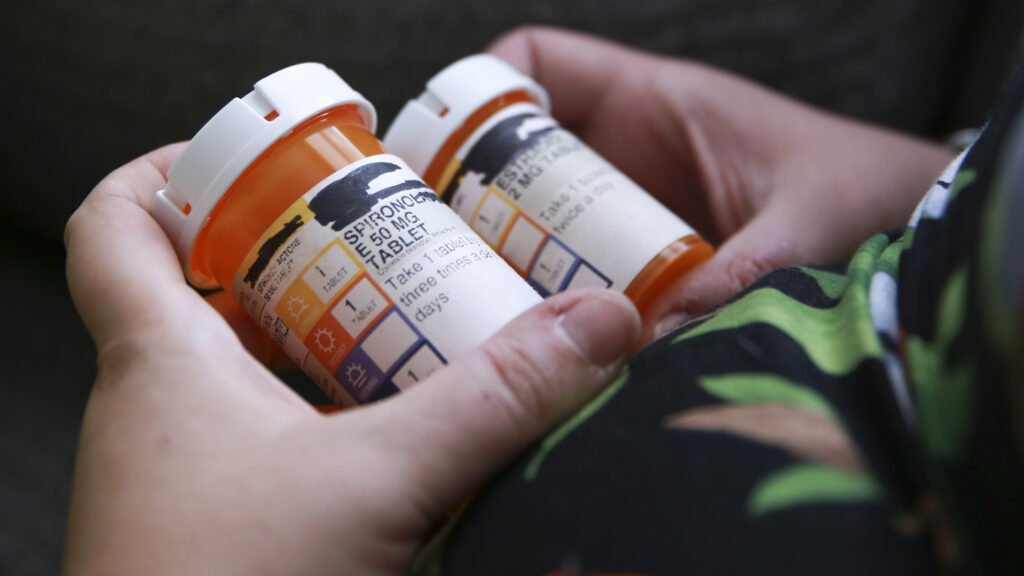Anti-trans legislation and rhetoric frequently suggest that taking gender-affirming hormones is a big health risk. But at the annual meeting of the Endocrine Society last week, researchers presented swaths of evidence on the benefits of gender-affirming hormones and the harms of trans discrimination, with the hopes of combating unscientific opposition.
“It’s very motivating to me to actually provide the evidence to show the benefits of hormones that I see every single day,” said Brendan Nolan, an Australian clinician and researcher at the University of Melbourne (Austin Health). At the meeting, Nolan presented what he says is a “world-first” randomized clinical trial on the benefits of gender-affirming hormones.
advertisement
Nolan and his team, who are still drafting a paper on the research, followed 64 trans adults — half of whom started their desired testosterone treatment immediately, while the other half waited three months, serving as the control group to be measured against. They found that people who were able to start testosterone immediately saw a decrease in gender dysphoria and a clinically significant decrease in depression and suicidal ideation compared with those who had to wait.
Researchers settled on the three-month delay because at Nolan’s clinic, that’s the length of the waitlist for any patient to begin hormone treatment. It wasn’t a blind study, as patients knew that they were either waiting for or receiving treatment. But Nolan believes it’s a start for building similar studies around trans health. Since gender-affirming hormones are known to have life-saving potential for gender-diverse people — who are already at high risk for mental health struggles — most researchers do not attempt randomized controlled trials.
“I would love for other people to see our study design and see if they thought that would be suitable to implement in other areas,” Nolan said. He hadn’t attended the annual meeting since 2018, and noticed a significant uptick in the number of presentations focused on trans and gender-affirming care this year.
advertisement
“I think that’s a reflection that there are more people undertaking this work, but also hopefully more people are recognizing the importance of education in this area,” he said.
A common talking point of those who oppose gender-affirming care, especially for youth, focuses on the potential regret people may later feel if they begin treatment in adolescence. Clinicians refute this as a rare phenomenon, but there has been little research on the topic.
This year, one presentation on a small study focused on one aspect of this question. At Emory University, researchers reviewed the cases of each adolescent with gender dysphoria who was treated at their pediatric endocrinology clinic between 2016-2018.
Only three out of 82 people ultimately chose to stop receiving gender-affirming hormones, and none of them did so because they were resuming their assigned sex at birth. According to a press release on the research, one person faced insurance issues, another was transitioning to a nonbinary gender, and the third stopped in order to conceive a baby.
“[The anti-trans legislation] is not taking into account the fact that there is so much more benefit than harm for the vast majority of people,” said Michael Irwig, an endocrinologist and director of transgender medicine at Beth Israel Deaconess Medical Center in Boston who attended the annual meeting.
Other research presented at the conference focused on the health risks that trans people really do face — not from hormones, but from discrimination. A team at the University of Michigan analyzed national data on emergency room visits between 2006-2018. They found that trans people who visited the emergency room were sicker than their cisgender peers and were much more likely to be admitted to the hospital from the emergency room.
Discrimination against trans people and fear of discrimination from providers can make it difficult for a trans person to access any health care, the researchers explained. This can lead people to go to the emergency room for basic care or when a serious condition is left untreated. In a press release about the research, lead author and physician Daphna Stroumsa said that transphobia has direct consequences on people’s health, and that addressing discrimination in society and in health care may help improve access to care outside the emergency room.
As transgender health has long been a more niche specialty of medicine, few endocrinologists have taken care of transgender patients, Irwig said. That makes the presentations at gatherings like the annual meeting critical for education in the field. But he believes that most are interested in learning more.
“We firmly believe policies governing access to transgender care should be evidence-based. Medical care should be informed by science, not politics,” Robert Lash, chief medical officer of the Endocrine Society wrote in a statement to STAT. “We are proud to host this important venue for exchanging scientific information on transgender medicine and other topics.”

